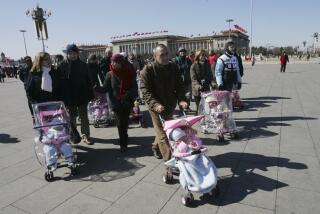China Shifts Tack in Birth Control
- Share via
MALANYU NO. 3 VILLAGE, China — Through two decades of counting babies and forcing parents to have fewer children, local officials in rural China have viewed family planning as the “No. 1 difficulty under heaven.”
Tensions over the policy run high in many villages, where children are needed to work on family farms. In some cases, anger has boiled over into violence. In others, farmers who want more children have fled their villages to evade punishment.
Now the central government is adding sweeteners to make its population-control campaign easier to accept.
It is offering women better health care and more contraceptive choices, starting in more prosperous parts of the countryside, such as Malanyu, in the hills outside Beijing. It also is expanding the use of economic incentives for family planning in the poorest areas.
The new programs are aimed at slamming the brakes on population growth. Strict rules on family size have succeeded in lowering the birth rate from about six babies per woman in 1970 to two today. But China’s population, now 1.2 billion, is still growing by 14 million people a year--a number equal to the population of Chile.
The rules are one child for urban families and, in many parts of the country, two for rural families, particularly if the first is a girl--a concession to the traditional preference for sons to carry on the family line.
Urban couples generally comply because they pay high fines and risk losing important benefits by having more than one child. But in the countryside, where most Chinese live, enforcement is difficult.
Rural officials are responsible for meeting family-planning quotas. Some take bribes to neglect to report births. Some resort to terror and force to make sure the rules are followed.
“It would be better to have blood flow like a river than to increase the population by one,” reads one rural slogan, according to a report by the Chinese newspaper International Trade News.
Women must get regular checkups and certificates to prove they are not pregnant. Those with unauthorized pregnancies are ordered to have abortions.
Population Action International, a research and advocacy group based in Washington, says it is impossible to determine how extensively physical force is used with those who refuse.
Chinese officials bristle when asked.
“We know what is good, what is bad. We are not foolish people. We take care of our Chinese women,” said Huang Baoshan, spokesman for the State Family Planning Commission.
But the government’s guidance is not always accepted.
The highest birth rates are in China’s poorest counties, where farmers still need their children’s labor and rely on their support in old age. Those who have extra children are fined, but some are unable or unwilling to pay.
Some farmers who want bigger families move to areas where enforcement of the policy is known to be lax. Officials also complain that family planning is especially difficult among the drifting millions of migrant workers.
“It’s the most difficult policy to enforce that China has ever had,” said Sheila Greenhalgh of UC Irvine, who studies China’s family planning. “There’s been a lot of hostility and resistance. It’s very, very serious.”
In one case, the daughter of a family-planning official was stabbed 42 times by a woman who had violated the rules and was angry with the official, the Yangcheng Evening News reported. The daughter survived the attack.
China sees no way around mandatory limits. The world’s most populous country already suffers from shrinking farmland, severe pollution and water shortages.
Huang, the Family Planning Commission spokesman, said China has made big changes in recent years by emphasizing family-planning benefits for families.
“If people benefit, they’re more likely to support it,” Huang said.
Malanyu, about 90 miles east of Beijing, is a model of family planning, with a broad choice of contraceptive methods, counseling and women’s health clinics.
Ma Fengzhi, a 31-year-old resident, lives in a new 10-room house with white tile exterior and largeblue glass windows. There is plenty of space for Ma, her husband, an auto parts dealer, and their only child, a 9-year-old boy.
Ma said she and her friends support the local limit of two children. People in Malanyu, an area with good transportation and many factories, find jobs outside farming and can buy insurance and save money for their old age, rather than relying on their children.
“What do people want big families for?” she asked. “It’s too tiring.”
In nearby Daliushu, farmer Yang Yuzhen said her chubby-cheeked 8-month-old daughter was the only child she planned to have. Otherwise, she said, “the burden is too great.”
Another experimental project in six counties trains family-planning workers to listen to women’s needs and to respond with better health care--instead of merely prescribing birth control.
More to Read
Sign up for Essential California
The most important California stories and recommendations in your inbox every morning.
You may occasionally receive promotional content from the Los Angeles Times.













